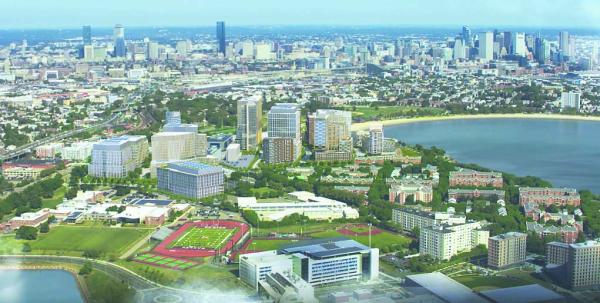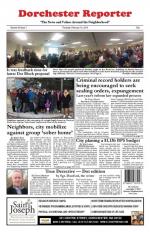February 9, 2022

An illustration from a proposal displayed during a recent community meeting on the Dorchester Bay City proposal shows the Columbia Point peninsula as it could look in the foreground. Image courtesy Accordia Partners/Ares
Members of a coalition at UMass Boston concerned about the scope and impacts of the sprawling Dorchester Bay City development on Columbia Point sought support from the Columbia-Savin Hill Civic Association this week. The civic organization attendees largely expressed solidarity with the representatives, as well as a desire to slow the development process and ensure that the new mayoral administration is made aware of their objections.
Steve Striffler, director of the Labor Resource Center and a professor of anthropology at UMass, told the civic organization at its monthly meeting that the faculty-led group is “concerned” about the 36-acre project and the community engagement process.
The “extremely large” development “woefully lacks affordable housing,” Striffler said. The size and location – near the oft-jammed Kosciusko Circle rotary, Morrissey Boulevard, and JFK/UMass station raise a significant risk of traffic problems, he said. Vitally, Striffler said, he is concerned about the lack of “community generating institutions” like educational facilities, senior centers, and public spaces.
Having presented their view to the UMass Boston Board of Trustees, he said, “We’re trying to get the university to be less of an uncritical cheerleader for the project and more of a better voice for community development.”
Bianca Ortiz-Wythe, a PhD candidate in UMass Boston’s Public Policy department, focused her critique on the university’s response to the project. She said the campus is “drifting from its central mission of providing education to working class students and students of color, advocating for residents and local institutions.”
Its response to the Dorchester Bay City project, Ortiz-Wythe said, “is a big red flag that it’s no longer about being an anchor institution for students and local institutions but about making money at expense of local residents.”
UMass Boston anthropology professor and Polish Triangle resident Tim Sieber noted that thousands of UMass Boston students and staff live in or are natives of Dorchester and South Boston. “We value this vibrant and interesting class- and racially-mixed neighborhood we live in,” Sieber said.
Dorchester Bay City, developed by Accordia Partners, LLC, he said, “seems like mega-development for newcomers, mostly white, wealthy, and childless,” and the affordable housing included is “laughable.”
As proposed, the Dorchester Bay City project exceeds city affordable housing requirements for new developments in the area, planning for 15 percent of all units to be made affordable at 60 percent Area Median Income (AMI). Ortiz-Wythe said there should be more deeply affordable units – while the initial demand letter asked for 50 percent affordable units overall, Ortiz-Wythe feels at least 60 percent of the units should be "truly" affordable as the project would be built on UMass Building Authority-owned land.
Three meetings took place in January on public Zooms hosted through the Boston Planning and Development Agency. Another is scheduled for next Thursday, Feb. 17, at 6 p.m. on the topic of “Urban Design & Open Space.”
Civic association members expressed mixed feelings on the openness of the community process.
Donna McColgan said the amount of support expressed in the public meetings felt like Accordia was “stacking” the gatherings and described the project as “a billionaire’s operation for billionaires,” echoing others’ sentiments that their objections are “not about being against development; it’s about the type of development.”
Kirill Shklovsky said he “found it very easy to participate in the community processes” through the Zoom meetings. He also raised a more favorable sentiment toward the project as fulfilling housing needs in general.
“We need to build more housing because we need to build more housing stock for every income level,” he said, asserting that the home and rental prices are rising in part “because of lack of building houses – we need to be a little more friendly about people coming in and wanting to join the neighborhood.” A few other meeting attendees agreed in the Zoom chat.
Ortiz-Wythe noted that there is a well-documented “digital divide” present in communities where not everyone has access to strong wireless internet, resulting in disproportionately lower participation from low-income residents and often people of color in virtual spaces.
Eileen Boyle said she was concerned about the timeline of the project before the BPDA and possible environmental impacts on the coastline.
“It’s another Seaport,” she said. “It’s horrible. It’s a horrible development.”
The civic group had reached out to the UMass Boston chancellor’s office to request a meeting, Boyle said, but were told that the project was in the city’s development process, which she took to mean the university had essentially “washed its hands of the situation.”
The next step, Boyle said, is seeking Mayor Wu’s attention “to slow down the process.”
The UMass coalition said they sent a letter with demands for more equitable development at the Dorchester Bay City site to local city councillors and the administration of acting Mayor Kim Janey, but did not receive responses. Sieber said the demand letter did make it into the BPDA’s scoping document for the project, so it is reflected in the public community process, but they received “no immediate responses from anybody.”
They expect to send an updated list of demands, adjusted for project changes, to Wu and to the newly inaugurated city council.



